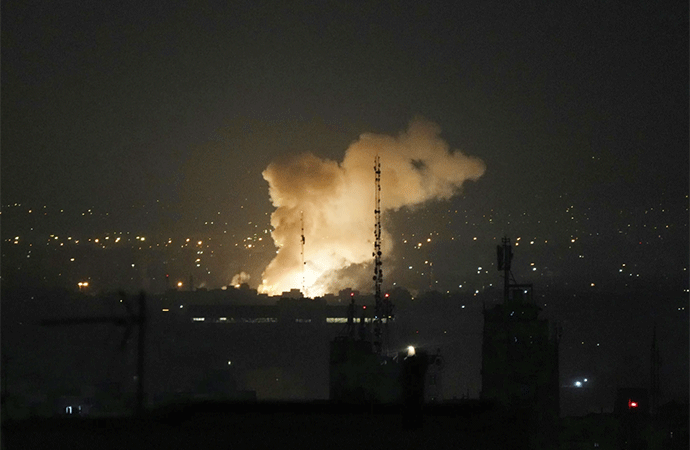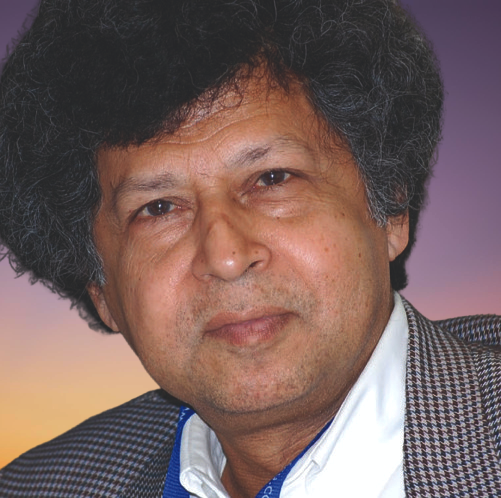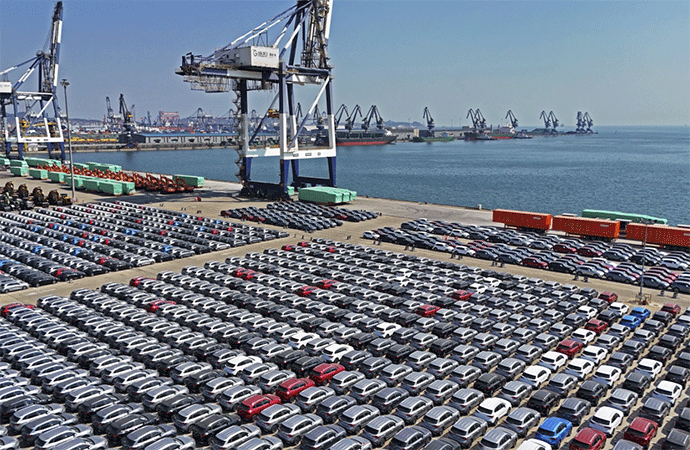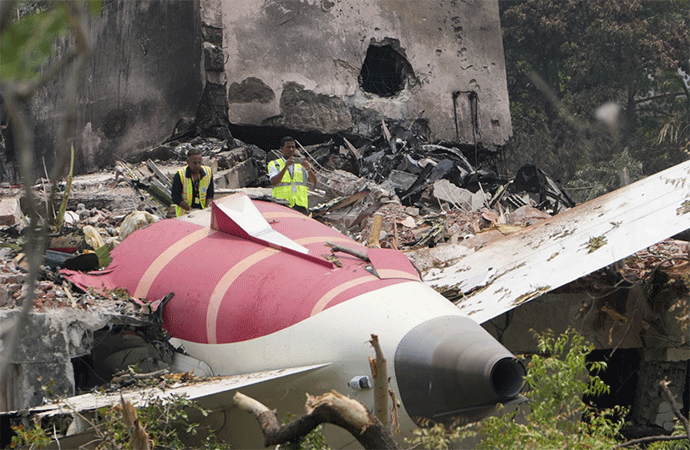Column

Smoke rises up after an explosion in Tehran, Iran, Friday, June 13, 2025. Photo: AP/UNB
The 12-day war between Iran, Israel, and the United States has ended-at least for now. But beneath the uneasy calm lies a tantalizing prospect: the possibility of a reshaped Middle East. A restrained Israel. A defanged Iran. A ceasefire in Gaza. Even-if one dares to dream-a return to serious talks on Palestinian statehood.
A Pause, Not a Peace
The war may be over, but the rhetoric isn't. In Tehran, Ayatollah Khamenei emerged from his bunker to declare victory, claiming Iran had landed a "slap on both cheeks" of the "Great Satan" and "Little Satan"-his names for the U.S. and Israel since 1979. Crowds chanted "Marg bar Amrika" and "Marg bar Israel"-"Death to America" and "Death to Israel." But the craters in Tehran and the funerals of Iran's nuclear scientists told a different story.
Israel and the U.S. struck hard. On day one, Iran's air defenses collapsed. Senior generals were killed. By the final day, U.S. B-2 bombers had dropped 30,000-pound ordnance on Iran's three key nuclear sites. Yet the Iranian regime claimed victory. Reality suggested otherwise.
It is true Iran had retaliated fiercely, launching thousands of missiles toward Israel. According to military analysts, 95% were intercepted. Still, Israeli interceptor stockpiles were running low. When Donald Trump proposed a ceasefire, Israel quickly agreed.
Iran, meanwhile, staged a symbolic counterstrike-firing 14 missiles at a U.S. base in Qatar. But it warned the U.S. and Qatar in advance. All but one were neutralized. The lone missile was allowed to detonate harmlessly. The absurdity of this war game was confirmed when Trump publicly thanked Iran for letting him know in advance. A U.S. analyst likened the exchange to a video game. Another called it Kabuki theater.
The asymmetry was stark: Israel, backed by U.S. firepower; Iran, isolated and broke. Russia and China offered only rhetoric. Iran's Arab neighbors did nothing. Even Syria's Assad-once an ally-has fled to Moscow.
A Revolution Running on Empty
Why did Iran, once feared as a regional power, appear so helpless? The answer lies in its hollow economy and mounting unrest. Sanctions have crippled Iran's oil and gas exports. Inflation, unemployment, and currency collapse have deepened poverty. Per capita income is just $4,400-compared to Israel's $52,000.
And yet, Tehran presses on with its "jihad." Despite losing proxies like Hamas and Hezbollah, despite political isolation, despite brutal crackdowns at home-Iran's clerical regime remains wedded to the myth of resistance. Nuclear weapons are not just strategic-they are ideological, the final talisman of a revolution that long ago ran out of popular legitimacy.
That's why, even after the bombing, Iran insists its uranium enrichment will continue. Western experts believe Iran could build a rudimentary dirty bomb, but not a deliverable warhead. The ambition, however, persists.
Israel, too, has its myths. For decades, Prime Minister Benjamin Netanyahu has warned-without evidence-that Iran is months away from building a bomb. This alarmism has become a political lifeline, helping him maintain power despite corruption charges and coalition chaos.
The war handed Netanyahu a propaganda victory. With Trump by his side, he looked like a man who could vanquish Iran and dominate Gaza. Now, buoyed by rising domestic support, he's expected to call snap elections, and may even agree to a ceasefire in Gaza.
What Comes Next for Iran
The real uncertainty lies in Tehran. The public has long tolerated economic hardship in the name of national defense. But for how much longer? Sensing unrest, the regime has returned to repression. Since the end of the war, at least 700 people-many of them women-have reportedly been executed on espionage charges without trial. UN Special Rapporteur Dr. Mai Sato has condemned the executions. Iran Human Rights director Mahmood Amiry-Moghaddam warned that thousands more may be hanged. "But fear no longer works," one anonymous Iranian told The Washington Post. If there's a fight, they will fight. They are not afraid anymore.
President Pezeshkian, a reformist, has spoken of loosening the clerics' grip. But real power remains with the Ayatollahs.
Containment, Not Regime Change
This war may have quietly redrawn the Middle East's political map. Iran once projected itself as leader of the "Axis of Resistance." But Assad is gone. Hamas and Hezbollah are fractured. Even Russia has backed away. Iran stands alone-and its neighbors have noticed.
Arab Gulf states, long wary of Iran's proxies, now see an opportunity. Saudi Arabia, the UAE, and Qatar no longer seek regime change in Tehran. They remember the chaos that followed the U.S. invasion of Iraq. Their preferred strategy is containment.
President Trump appears to agree. As Johns Hopkins University scholar Vali Nasr put it, Trump doesn't want to destroy Iran-he wants to bleed it dry. Like the Cold War doctrine against the Soviets, the goal is slow attrition: economic warfare, proxy balancing, and ideological exhaustion. But this strategy of containment, warns Iran expert Ali Vaez, will be messier, less coordinated, and far more entangled in regional politics.
Gaza: The Unfinished Business
Then there is Gaza-the festering wound. Israel's bombardment has drawn global condemnation. Its failure to recover hostages has sparked outrage at home. Netanyahu may soon need a ceasefire just to survive politically.
Arab leaders, too, are pressing Trump to rein Netanyahu in. They've backed a new U.S. plan for Gaza-but with a crucial caveat: Israel must accept a two-state solution. That's a tall order, but perhaps not impossible if pressure mounts.
Meanwhile, Hamas fighters continue to resist, relying on funding from Qatar and a few other states. But if that support evaporates, they may be forced into exile. That, paradoxically, could open the door for a more durable ceasefire-if not peace.
The Snake without Fangs?
Saudi King Abdullah once called Iran a "venomous snake" whose head must be cut off. Today, that snake may have lost its fangs. His successors now believe it's time to impose a regional peace-or at least a managed stalemate. That would please both Washington and Tel Aviv, and help Arab leaders keep their restless populations in check.
If this scenario ap holds, then yes: Trump, Netanyahu, and the Gulf bloc can claim victory. But Iran's internal crisis remains volatile. Repression will breed resistance. And that tension-between power and people, ideology and survival-could once again drag the region into a wider war.
So is this ceasefire a prelude to peace? Or merely the calm before another storm?
The writer is a journalist and author based in New York.

























Leave a Comment
Recent Posts
Religion and Politics: A Toxic ...
At Dhaka University, cafeteria workers have been told not to wear shor ...
Enayetullah Khan joins AsiaNet ...
AsiaNet’s annual board meeting and forum was held in Singapore, ...
In a New York minute
Many leaders back a UN call to address challenges to ..
Defaulted loans at Non-Bank Financial Institutions ( ..
How the late Zubeen Garg embodied cultural affinitie ..